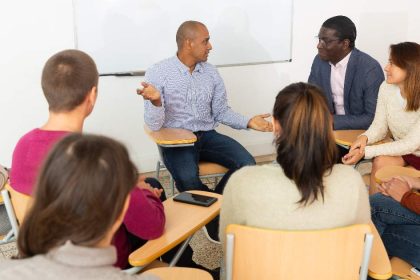One in three young Australians rely on “violent and degrading” pornography to teach them about sex, a new report reveals.
The online survey of 832 Australians aged 16 to 20 was commissioned by Our Watch,
It asked the young people about sex, gender roles, dating and relationships, as well as their attitudes towards pornography.
The research showed that young people viewed pornography for the first time, on average, at 13.6-years-old – often before they’d received the education to help them access the tools needed to properly understand what they were viewing.
31 per cent of participants say they are watching porn as a form of sex education – even though many know it’s not a good way to learn about sex.
Our Watch CEO Patty Kinnersly says that, although pornography is not inherently problematic, a lot of it “is violent and degrading toward women”.
“A lot of young people are saying that they’re learning about sex and sexual relationships and relationships by using pornography, and then they’re holding those values and those views as they go into intimate relationships.”

Normalisation of sexual violence is concerning
“It’s the normalisation of aggression and misogyny and things like strangulation that has developed in recent decades that is particularly concerning,” says Kinnersly, who points to stats showing that one in three Aussies aged 18 and 19 have reported experiencing intimate partner violence in the past year.
She believes better sex education in schools is one way to help: “If you think about people as young as 13 starting to see violent pornography that really perpetrates violence against women in particular, and that there is a high percentage of young men watching this pornography regularly and normalising it, it’s not necessarily surprising that it’s coming out in intimate partner relationships in their early years.”
Teaching teens sexual strangulation is not healthy
Another survey conducted earlier this year by the University of Melbourne Law School and the University of Queensland of 4702 people aged between 18 and 35 revealed that 57 per cent of participants had been strangled during sex at least once. More than half (51 per cent) reported having done it to a partner.
Kinnersly describes these statistics – largely influenced by the depiction of sexual strangulation in contemporary media and mainstream pornography – as “mind-blowing”.
In pornography, choking is often shown as an act of pleasure rather than one that can cause harm. Yet “there is no safe way to practise strangulation or to give consent during strangulation,” Kinnersly says.
But the more common it becomes, the more young people feel pressured to take part.
“If young women are seeing as normalised that they are submissive, and that choking – and overwhelmingly, women are the receivers of the choking – if they’re seeing that as normalised and that’s the way they have to behave in a normal relationship, then clearly it’s going to have a big impact on young women and their esteem and what they’re expecting in healthy relationships,” Kinnersly says.
Tp help counter the problematic exposure to violent porn, she says Our Watch’s The Line campaign, a primary prevention resource that runs on a number of social media platforms and supports young people to have respectful, healthy relationships, is a helpful resource.
“I think that because so many of us haven’t grown up with the online environment being a normal part of our day-to-day experience …(we forget) that it is just absolutely a part of people’s worlds,” she says.
“We have to understand that that’s the truth for young people. We have to meet them where they are.”
Support is available:
If you or someone you know is experiencing sexual abuse or family violence contact:
- National Sexual Assault, Domestic Violence Counselling Service 24-hour helpline 1800 RESPECT on 1800 737 732
- Safe At Home helpline on 1800 633 937
- National Violence and Abuse Trauma Counselling and Recovery Service on 1800 385 578. They also have a specific line for the LGBTIQA+ community called the Rainbow Sexual, Domestic and Family Violence Helpline on 1800 497 212
- SHE (free and confidential counselling and support) on (02) 6278 9090
- Bravehearts – Sexual Assault Support for Children on 1800 272 831
- Kids Helpline is for young people aged five to 25 on 1800 551 800








